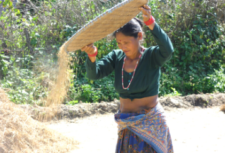Disclaimer: This article is more than 15 years old, and may not include the most up-to-date information or statistics. Please verify information with more recent sources as needed, and if you have any questions contact our Press Office.
9 September 2008
Anti-Slavery International, the world’s oldest human rights organisation, welcomes the decision by the government of Nepal to free 20,000 people in slavery by abolishing the local bonded labour practice of ‘haliya‘. The organisation also calls for official support to help the freed labourers find alternative livelihoods and to protect discriminated people from becoming victims of slavery in Nepal.
The government of Nepal unexpectedly announced on 6 September that they have abolished the haliya system of bonded labour. The haliya system is an agricultural bonded labour practice in the Western hills of Nepal that affects seasonal labourers.
Bonded labour is a form of slavery. Haliya also refers to the bonded labourers and the literal translation means ‘one who ploughs’. Labourers have to work as haliya to pay off loans to their moneylender-landlord. Once in debt they lose all control over their conditions and through exorbitant interest rates and other charges become trapped and unable to pay off their debt.
The Nepal government also announced they had cancelled the debt of the haliya who previously worked the land of their moneylender-landlords. Many work for years, sometimes even generations, in the vain attempt to repay their loan.
Enrique Restoy of Anti-Slavery International, said: “Anti-Slavery International welcomes the decision by the Nepal government to abolish haliya and the cancellation of debts, which have trapped 20,000 people in slavery.”
The previous government of Nepal abolished ‘kamaiya‘ another form of bonded labour in 2000. Enrique added: “It is important that the new government learns from previous attempts to end bonded labour in Nepal and establishes an effective legal framework to back up this decision, protect former bonded labourers from slipping back into slavery and prosecute anyone who carries out the practice.
“The government also needs to guarantee that freed labourers have official support to find alternative work and give them access to productive land to grow food to support their families. An official monitoring system should be set up to check on the success of the rehabilitation.”
Haliya predominately affects Dalits in western Nepal. Dalits is the self-preferred term for ‘untouchables’ in the Hindu caste system. Enrique said: “Time and time again we see that discrimination lies behind slavery. Dalits in Nepal are for more likely to be trapped into slavery because they are offered poor wages, typically do not own land and are victims of underhand money lending practices.”
NOTES TO EDITORS:
- For further information please contact Paul Donohoe, Anti-Slavery International’s Press Officer, on 020 7501 8934 or email p.donohoe@antislavery.org
- Support Anti-Slavery International and join the Campaigns Network





